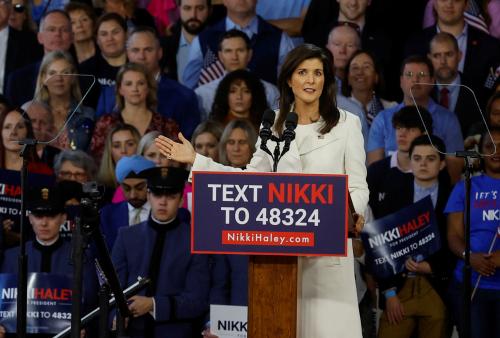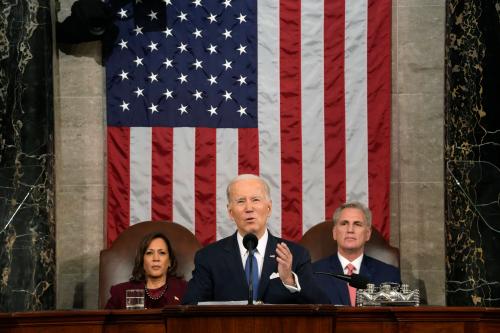Unlike many of the other countries in the world, the United States is lucky to be surrounded by two vast oceans and two friendly neighbors. Thus, a sizeable portion of the American public has always had isolationist tendencies. We stayed out of the Second World War for over two years despite images of Nazi control over much of Europe and Japanese conquests in China. Only when the country was attacked on December 7, 1941, did the U.S. finally enter the conflict. Since then, we’ve fought in Korea, Vietnam, Iraq, and Afghanistan and innumerable undeclared military interventions on the theory that the U.S. must intervene abroad to prevent threats at home. And each one of these conflicts re-awakened isolationist tendencies that had lain dormant since our victory in World War II — sometimes referred to as the last “good war.”
In recent decades, America’s two major political parties have shifted their stances. Throughout the latter half of the 20th century, and indeed through the George W. Bush presidency, it was the Republicans who typically favored foreign intervention. But under Donald Trump’s leadership, the Republican Party experienced a definitive shift in their foreign policy objectives. In his first UN address, Trump announced to the world, “The United States … can no longer be taken advantage of or enter into a one-sided deal where the United States gets nothing in return. As long as I hold this office, I will defend America’s interests above all else.”
Trump has had a big impact on Republican voters
Clearly Trump has changed the Republican mindset on foreign policy. According to a 2017 Pew report, Republicans supporting less global involvement increased from 40% to 54% from 2004 to 2017. Interestingly, among Democrats, the number who wanted the United States to be active increased from 37% to 56%. In these highly polarized times, Trump’s position on global involvement probably caused Democratic voters to take the opposite position. But in 2020, Trump lost, Biden became president and recommitted to the U.S.’s allies. Then Russia invaded Ukraine. Since then, the U.S. has supplied the Ukrainians and NATO has been strengthened.
So how do Americans feel about this? One year into the conflict where are Americans when it comes to the big questions of intervention in the world?
A plurality of Americans favor isolationism
Tracking American views on foreign policy is difficult since these issues tend to be of low salience to most voters. For instance, when Gallup asks voters the open-ended question: “What do you think is the most important problem facing the country today?”, practically no one mentions a foreign policy or national security question.
In addition to the low saliency of foreign policy issues, terms like isolationism, multilateralism, etc. are probably unfamiliar to many Americans. Thus, polling on these issues is subject to the production of “non-attitudes” — where voters pick a position in order to sound informed but without having any firm convictions about it.
In an attempt to get around these problems, the polling group Morning Consult has created an index composed of questions about soft power and foreign aid, overseas military engagement and trade and investment. They then use questions about these topics to construct an index that measures attitudes towards international isolationism and engagement.
According to Morning Consult’s U.S. Foreign Policy Tracker Index from January of 2023, nearly 40% of voters favor isolationism, while 30% want stability, and 17% want engagement. Among Democrats, 33% favor isolationism, 33% want stability, and 20% want engagement. Among Republicans, 45% favor isolationism, 28% want stability, and 15% want engagement. While these findings do indicate a divide between the parties on the issue, in both cases isolationism was the top answer or tied for the top answer. Neither side wants to be the world’s police.
Large numbers oppose a unilateral approach
On the question of multilateralism or stability versus unilateralism in U.S. foreign policy, almost 70% favor multilateralism or stability. Very few, only 17% want a unilateral approach. Apparently, Republicans’ support for multilateral dispute resolution has stabilized. Only 22% favor a unilateral approach. It’s clear Americans don’t feel they are ready to go at it fully alone. They still value the countries allies.
Americans want to remain involved in international organizations
Thirty-four percent of voters favor increasing involvement in international organizations like the United Nations. Thirty-three percent favor neither an increase nor decrease, and 21% want to decrease involvement. These findings seem to indicate that isolationism is not a coherently held view. Many want the U.S. to be isolationist, but they don’t want to be isolated from their allies or international organizations.
Americans are reluctant to increase the deployment of American troops overseas
Only 16% of voters favor increasing U.S. troop deployments overseas, as opposed to 32% who want neither an increase or a decrease, and 40% who want to decrease deployments. It is possible that those who want neither an increase nor a decrease are examples of a “non-attitude” as opposed to support for the status quo. With the withdrawal from Afghanistan still in the minds of many, it is unsurprising that Americans are currently reluctant to place American service men and women in harm’s way.
Russia’s invasion of Ukraine is not a top concern of American voters
When voters were asked to name the top five most important foreign policy issues facing the United States, terrorism was first with 49% mentioning the issue, immigration second with 45%, cyberattacks with 41%, drug trafficking at 41%, and climate change at 39%. It is noteworthy that these issues may be international, but they have strong implications for domestic policy as well. U.S./China relations was mentioned 27% of the time, and Russia’s invasion of Ukraine was mentioned 24% of the time. Upholding democracy globally was mentioned only 14% of the time. Americans appear to be more concerned about potential issues at home, versus wide ranging geopolitical events with not yet clear ramifications.
Americans still support aiding Ukraine
When it comes to Ukraine, according to Gallup, one year into the war, 39% of Americans say the U.S. is doing the right amount to aid Ukraine, 30% say not enough, and 28% say the U.S. is doing too much. Additionally, nearly three-quarters of Americans support continuing economic (71%) and military (72%) aid to Ukraine, and 58% are willing to continue to support the country “as long as it takes,” even if U.S. households will have to pay higher prices for gas and food.
Europe and the NATO alliance are seen as increasingly important
According to a 2022 poll of American public opinion on U.S. foreign policy by the Chicago Council on Global Affairs, 81% of Americans say the United States should maintain or increase its commitment to NATO, “the highest level of support recorded since Chicago Council Surveys began in 1974.” They also found Americans’ support for U.S. military bases in Europe to be their highest levels in nearly 50 years of polling by the Council. The Chicago Council notes that this represents a notable shift from past surveys when their security concerns focused squarely on the Middle East. Further polling found Americans across the political spectrum agree Europe is now the most important region for U.S. security (50%), up from 15% two years ago.
Americans prefer to wage economic warfare
Forty-eight percent of Republicans favor increasing tariffs, versus 34% of Democrats. So much for the party of free trade. This is clearly a reaction to the economic rise of China. Gallup polling indicates that as of 2022, nearly 80% of Americans have an unfavorable view of China, a drastic increase from 2018 when it was 45%. U.S. hegemony derives much of its power from the country’s economic dominance. The rise of China as an economic competitor and possible adversary has convinced many that steps are needed to counter the threat. But do Americans feel this means we must now prepare for war with China the way the country was for so long with the Soviet Union? When Gallup asked whether the U.S. was spending too little, the right amount, or too much on national defense and military in 1981, 51% of respondents answered too little, 22% about right, and only 15% too much. In 2022, 32% said too little, 34% about right, and 31% too much. This seems to indicate Americans may be more willing to use economic competition to achieve their goals rather than military force.
Conclusion
Foreign policy has never been a front and center issue for the American public unless the country was involved in a major war. Thus, it is not surprising that American attitudes on foreign policy are hard to pin down. In some instances, pollsters may simply be measuring non-attitudes. In other scenarios, Americans may have a complex set of opinions; favoring, for instance, a general isolationist approach but valuing at the same time our alliances and our participation in international organizations or favoring our position in Ukraine but preferring economic warfare to troop deployments. This poses a challenge for policy makers but also illustrates the importance of clear leadership and messaging when it comes to foreign policy.








Commentary
One year into the Ukraine war — What does the public think about American involvement in the world?
February 23, 2023